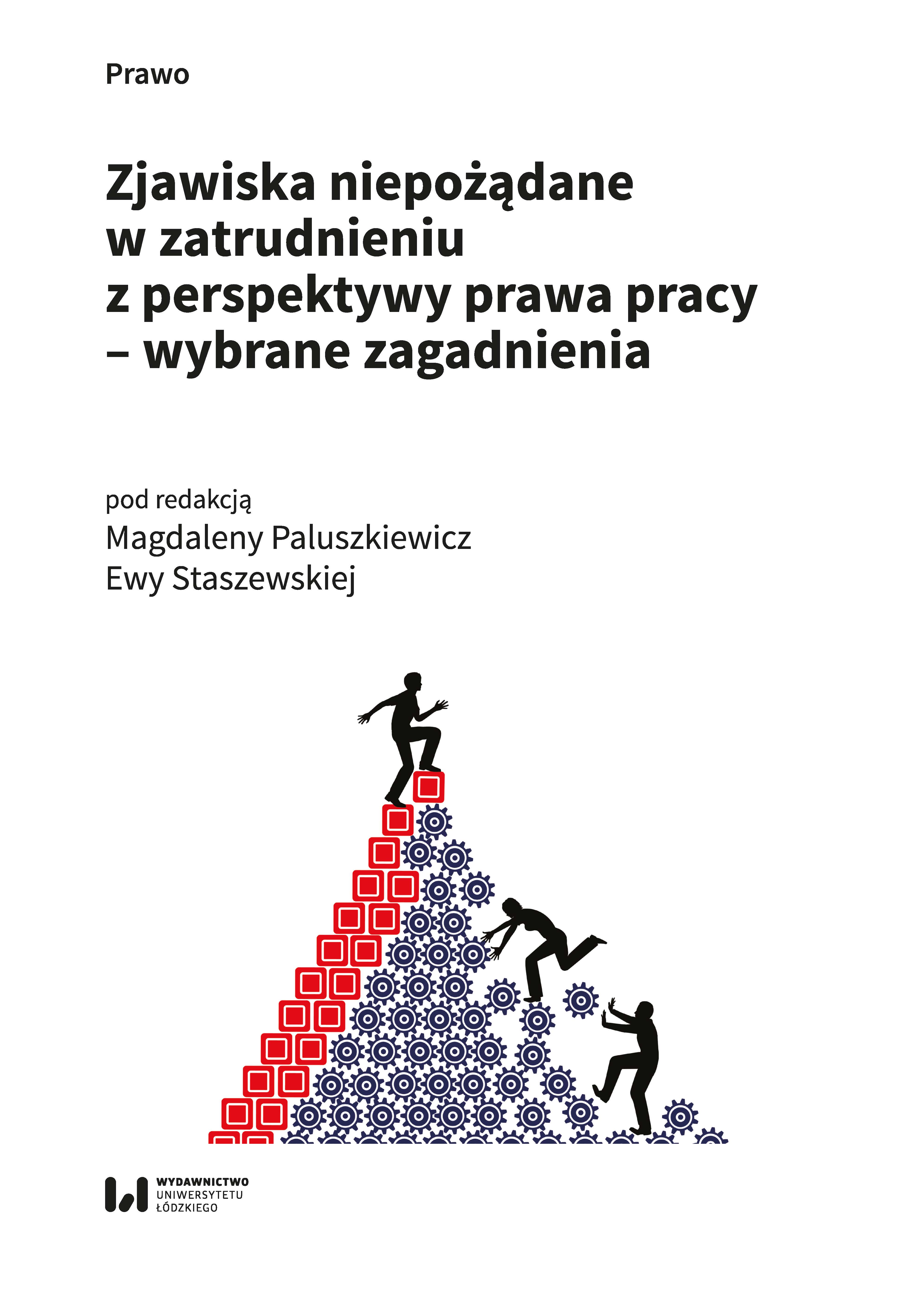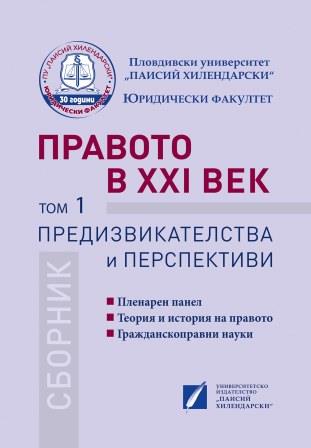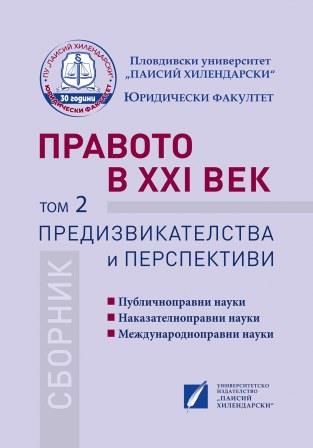
We kindly inform you that, as long as the subject affiliation of our 300.000+ articles is in progress, you might get unsufficient or no results on your third level or second level search. In this case, please broaden your search criteria.


This study investigates the new definition of violence and harassment included in ILO Convention No. 190 and selected measures for its elimination provided in the convention act. These proposals have been compared with the currently binding Polish regulations. The aim of the study is to conduct a comparison and to show how laconic and oftentimes imprecise – in relation to the demands formulated in the convention Polish regulations remain in many respects. The paper will highlight the most intriguing solutions provided for by the convention, yet not currently implemented in the Polish legal system.
More...
The aim of the study is to examine the applicable legal regulations on mobbing in relation to the evolving forms provision of work and other pathological phenomena not classified as mobbing. The starting point for the considerations is the definition of mobbing contained in the applicable provisions of labor law. Personal rights were also subjected to a detailed analysis, the violation of which may be the basis for pathological behavior not classified as mobbing.
More...
The study focuses on the issue of anti-mobbing proceedings. In this text, the Anti-Mobbing Committee was taken under the microscope in the light of jurisprudence. It is a special body because its members are selected by the employer, who may also turn out to be a mobber. This is controversial due to the possible lack of objectivity. The authors also noted that the anti-mobbing procedure itself is not widespread among employees, and it is the employer’s duty to define it. The paper also draws attention to e.g., for allowing the need to share protocols of specific proceedings of the Anti-mobbing Committee or its responsibility for tasks in situations where it was appointed by the employer. After analyzing the jurisprudence, the authors come to various conclusions and emphasize the importance of the existence of the Anti-Mobbing Committee and some aspects related to it, both with the committee itself and its role in the above-mentioned procedure.
More...
The article deals with the issue of the concept of occupational burnout. The work includes aspects of foreign solutions related to this term, as well as de lege ferenda postulates in the field of Polish labor law regulations relating to pathologies in the work environment that can lead to professional burnout.
More...
The concept of reasonable accommodation for persons with disabilities and the employer’s obligation to implement it has been extensively described in the doctrine, given its ambiguous recognition in international or national legislation. By analysing national and European jurisprudence, literature, reports and so-called good practices, this chapter will be dedicated to any necessary changes adapter to the needs of people with disabilities in the workplace, so-called reasonable accommodation, to combat discrimination inemployment.
More...
In last three years, especially as an effect of COVID-19 pandemic, the remote work became commonly used solution, but implementation of this form of the work in many professions, with many workers at the same time with no previous preparations led to numerous problems, like necessity of providing access to equipment and Internet, need to reorganisation of working time and attempt to adaptation of tasks to a cyberspace. It created an occasion to abuses and misuses the uncompleted law regulations by some employers. It was aided by regulations of Labour Code norming the question of teleworking which was not enough for pandemic situation and regulations of so-called Anti-Crisis act which allowed the employers to implement the remote working without the consent of employees. Consequently, legislator devised the project of Labour Code amendment which aim was also to defining and implementing remote work to legal system in concordance with other labour law regulations. The aim of the study is an attempt to point main problems of employees in situation of remote work, analysis of teleworking and remote working regulations and evaluation of its utility as well as presentation regulations of Labours Code amendment and its role in improving the employees’ situation after pandemic.
More...
Roman Law is the founding principle of the whole civilian tradition; it is the very basis of the legal systems of the European continent. This is evident for example in the notion of contributory negligence in civil law. If the damaged person is in any way to blame for causing the loss, the reparation of the damage suffered should be compensated, even if possible, divided into equal parts. This principle appears as a development of the answer that Roman jurists had already given in the barber case (Digest.9.2.11 pr.).
More...
Philosophy has always influenced the development of legal thought over the centuries. On the basis of the philosophical aspirations in the individual historical epochs of the development of the society, the specific doctrines searching for the essence of law were created. The Historical Law School is no exception to this trend. The text of the report presents the importance of the philosophical direction of Romanticism for the creation and development of the Historical Law School. It is concluded that each of the ideas of this legal school formed its views in the spirit of romanticism.
More...
In recent years, we have witnessed constant volatility in society, accompanied by high levels of uncertainty and unpredictability, which inevitably has an impact on legal reality. Such type of processes must be controlled by seeking solutions not only to reduce the negative outcomes. We also need to exploit the opportunities offered by the ever-changing environment. For this purpose we need appropriate legal tools and techniques. The normative nature of the law and the principles enshrined therein contribute to order, harmony, legal security and predictability in legal system and social relations in general. Law is not closed in itself, but interacts with other normative and social systems and in the process of this interaction can find useful solutions. An example of this is the legal concept of ‘regulatory impact assessment’, which, from a political instrument, with emphasized economic features, through its institutionalization becomes a legal instrument, supporting the law-making process and hence the functioning of the legal system.
More...
Human well-being reflects the level of socio-economic, physical, mental and spiritual condition of a society or an individual. It is defined as a positive qualitative characteristic of people’s lives, such as the level of satisfaction or usefulness of members of society. Socio-economic rights, on the other hand, are an expression of the state’s commitment to create a favourable environment, in its active position to ensure a national concept. They are the basis for the regulation of relations between people in society, and at the same time they contribute to the formation of the best possible conditions for the development of each individual.
More...
Intellectual property originates, exists, functions and develops as a legal discipline and matter. Over the years, with the changes in the business world, it was transferred to economic science, and three aspects of its existence - legal, financial-economic and accounting - were gradually formed from the legal essence of intellectual property.
More...
For the first time in Bulgarian law and theory I raise the issue of causing damages from mass accidents with the participation of several causal agents. An important place in the article is the study of the contribution of the infrastructure in which vehicles cause property and non-property damage to individuals and legal entities. The forms of joint causation of damages and the legal consequences that arise from them are considered. For the first time, the joint responsibility of the owners and drivers of motor vehicles and the companies responsible for the poor road infrastructure, which contributes to the mass road accidents with many victims that have occurred in Bulgaria in recent years, is substantiated.
More...
With the Law on the Provision of Digital Content, Digital Services and Sale of Goods, which has been in force since the beginning of 2022, contracts for provision of digital content are explicitly regulated. Being a part of legislation on consumer contracts, the law does not define digital content contracts as a particular type. This feature raises the question whether one is able to subsume digital content contract under standard types (sale, lease, service and work’s contracts) or it is a sui generis (innominate) contract.
More...
The study addresses the impact of the bait advertising on consumers as an unfair commercial practice especially in a period of high inflation. The essential elements of bait advertising and trader’s responsibility are further examined. The trader’s professional diligence is evaluated in relation to the average consumer. Based on due diligence it is commented whether by offering products the trader is obliged to take into consideration the circumstances relating to the economic crisis.
More...
The legal definition of the term employer is contained in the Labour Code. The Social Services Act defines the term as a ‘person who manages the activity of providing the service’. This is the person appointed by the social service provider to render management services. This is also the person who is the employer of the staff carrying out the activity of providing the service. Under this definition the person in charge of the social service, in his/her personal capacity, shall be the employer of the employees. The quoted norm poses a number of practical problems relating to the constitution of a proper defendant in legal employment disputes.
More...
Public law regulates relations between the state and its bodies, citizens and their organizations using an authoritarian method. However, the perspective of power relations is being deformed in the digital world and traditional roles are blurring into a new arrangement. Authoritarian legal relations are reduced to conditionally equal ones, and public actors are replaced by quasi-public, private or outright virtual entities.
More...
The form of the state is the model of the organization and the realization of public authority. It can be defined as a way of integrating the state-forming elements (territory, people and power) into a complete device of the state, as a result of which it acquires its own specific appearance. The form of the State can be defined as the constitutional law order in the State. The classic division of the forms of the state subdivides them into two main categories. This report will examine the form of government in the Republic of Bulgaria with its specifics and characteristic features. The mechanism by which changes in the form of state government can be made according to the modern constitutional model in Bulgaria will also be presented.
More...
In decision 12 of 27.09.2022, the Constitutional Court of the Republic of Bulgaria gave an interpretation of the wording of Art.132a of the Constitution, stating that upon the expiry of their term of office the Inspector General and the Inspectors in the Inspectorate to the Supreme Judicial Council continue to exercise their functions until the election of new members of the Inspectorate by the National Assembly. In the paper, the author presents some reasoning on the case and makes suggestions for constitutional amendments concerning the legal status of the members of the Inspectorate.
More...
The paper discusses the legal nature of the municipal council rules of procedure in the Republic of Bulgaria. Also the legal nature of the rules of procedure as secondary legislation is studied. The development of the provisions of the Local Self-Government and Local Administration Act related to the municipal council rules of procedure is analyzed. Attention is paid to the case law of the courts and the relevant provisions of the European Charter of Local Self-Government. A few perspectives faced by the municipal council rules of procedure that could improve the local self-government are suggested.
More...